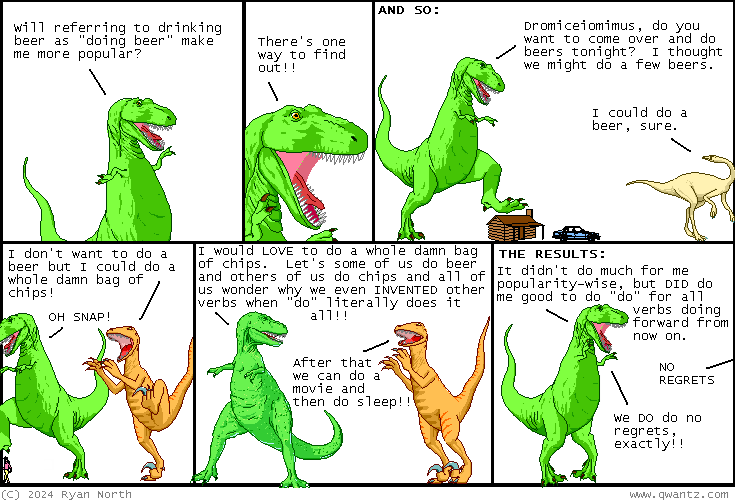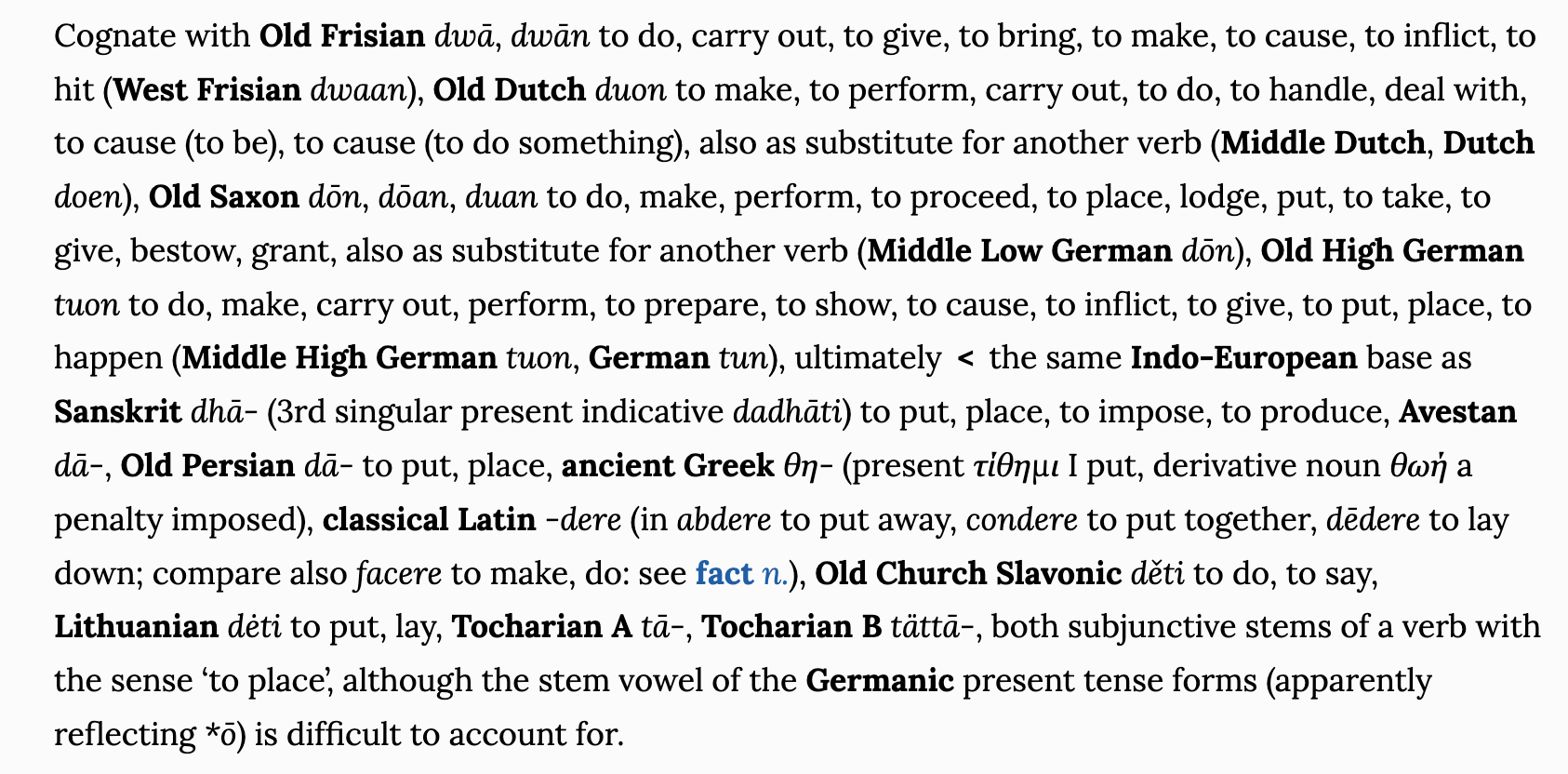Doing well
« previous post | next post »
Mouseover title: "why do other verbs when "do" does do all you did do are doing or can and will do??"
Of course do already does most of what Ryan North wants — Wiktionary gives it 31 senses, from (1) "A syntactic marker in a question whose main verb is not another auxiliary verb or be" (Do you got there often?) to (31) "To drive a vehicle at a certain speed, especially in regard to a speed limit" (He was doing 50 in a school zone). Along the way we get (29) "To take drugs" (I do cocaine), which is not far from Ryan's "do beers tonight" — and for that, there's already a t-shirt:
Do's utility has been around for a while, judging by the OED's recital of Germanic cognates and further-out IE connections:
Other languages have taken a different path in choosing an everything verb, for instance starting with "make" rather than "put" (French faire / Spanish hacer), resulting in a somewhat different semantic spread.
Commenters will no doubt be able to fill us in on what other lexical seeds have similarly sprouted in other languages.



Jason said,
October 8, 2024 @ 5:48 am
It's hard to tell with such as polysemous worf, but I suspect that Ryan North means "to do beers" in what I like to call the Oprah Winfrey sense, after an alleged anecdote in the Kitty Kelly biography Oprah Winfrey is in a swanky old boutique store and the shop assistant invites her to come upstairs to see more merchandise, only to be told, frostily, by Oprah's assistant, "Excuse me, but Oprah does not DO stairs."
Benjamin E. Orsatti said,
October 8, 2024 @ 7:52 am
I wonder if it was simply the case that "set" (cf. "put") had already been too loaded up with polysemy to take on any more breadth of meaning?
And, now that you mention it, it does always seem a little less-than-satisfying settling on "fa(i)re" in Italian or French for an L1 Anglophone who wants to get across the sense of "do", as if there did exist a word in those languages that differentiated "do" from "make", which I just haven't found yet.
Jonathan Smith said,
October 8, 2024 @ 9:50 am
"do [item on menu]" is sadly ubiquitous order-placing language. So "do a beer" is definitely nothing novel.
JimG said,
October 8, 2024 @ 10:12 am
We already suffer with the massive-multipurpose verb "gowho needs this?
JimG said,
October 8, 2024 @ 10:20 am
… "go", meaning "say" or "wear" or "think" or make keyboard input or whatever, so who needs this?
Coby said,
October 8, 2024 @ 1:05 pm
German often prefers machen to tun: Was machst Du? rather than Was tust Du?.
And the topic of "do" reminds me of a time in a café in a small town in England, when I asked for brown bread with my breakfast and was told "We don't do brown bread."
Stephen Goranson said,
October 8, 2024 @ 1:26 pm
For good or ill, advertisers contributed: just do it; do the Dew.
Kenny Easwaran said,
October 8, 2024 @ 3:22 pm
Benjamin Orsatti might be interested in the NYTimes crossword puzzle from June 10 of this year, which made extensive use of the polysemy of "set" – anyone who isn't worried about spoilers can see how here: https://www.xwordinfo.com/Crossword?date=6/10/2024
Francis Deblauwe said,
October 8, 2024 @ 6:22 pm
Let's not forget the erudite "to smurf," originally "schtroumpfer" in French :-)
"A characteristic of the Smurf language is the frequent use of the undefinable word "smurf" and its derivatives in a variety of meanings. The Smurfs frequently replace both nouns and verbs in everyday speech with the word "smurf": "We're going smurfing on the River Smurf today". When used as a verb, "to smurf" typically means "to make", "to be", "to like", or "to do"." (https://en.wikipedia.org/wiki/The_Smurfs#Language)
Benjamin E. Orsatti said,
October 9, 2024 @ 8:13 am
Kenny,
Neat! The NYT crosswords are one of my great joys in life (the Post-Gazette gets them in syndication about a month after publication). The ratio of cleverness per grid square is dense indeed.
Francis,
No need for a unicode smiley — your comment may confidently be made in earnest. As it happens, in "Kant and the Platypus", semiotician and perhaps the world's last "Renaissance Man", Umberto Eco, made a similar observation. I don't remember all the correct semiotic "lingo", but the basic idea was that Les Stroumpfs could replace an alarming amount of their spoken vocabulary with the word "Stroumpf", but only in cases where the cultural milieu already had a sense of the intended referent (maybe it would also apply to things knocking around in the Collective Unconscious, if one were to swerve Jungwards). So, for example, you could say, "Gimme a beer, I've been stroumpfing (i.e. "working") my stroumpf (i.e. "ass") off, but you couldn't say, "Gimme a stroumpf, [etc.]", unless you were at a bar that only sold beer.
So, even though Gargamel spoke the same French as the Stroumpfs, in the cartoon, he could never understand what they were saying, and Eco posits that this is because Gargamel and the Smurfs didn't share the same cultural referents (or "dynamical objects" or whatnot).
Stephen Goranson said,
October 11, 2024 @ 10:01 am
Also, these days: "you do you."